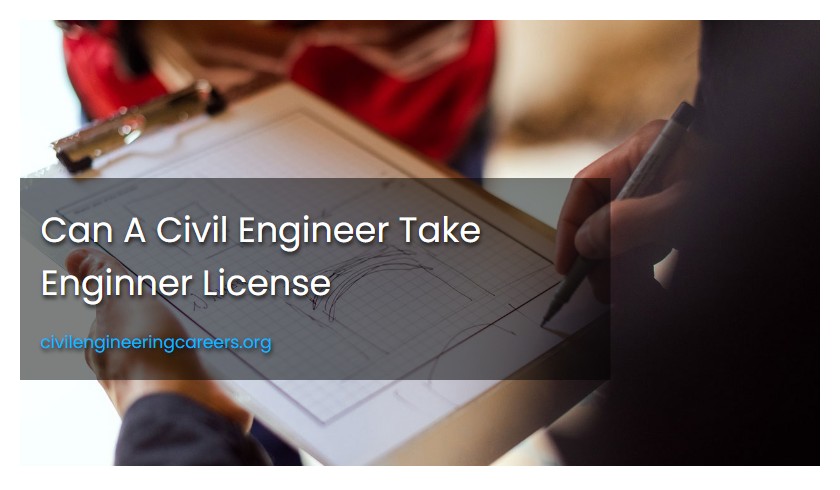Can A Civil Engineer Take Enginner License

Having a degree in engineering is essential for individuals looking to enter the field of civil engineering. This is because most civil engineers require a Professional Engineers (PEs) license to legally stamp official papers, which typically requires at least a bachelor's degree in engineering.
Senior civil engineering positions often require a Professional Engineering (PE) license, which typically consists of meeting four criteria, including obtaining a degree from an engineering school accredited by the Accreditation Board for Engineering and Technology.
How do I get a civil engineering license?
To obtain a civil engineering license, a degree from an ABET-accredited program is required for the professional engineer (PE) license. A bachelor's degree in civil engineering technology may also meet the academic requirement for obtaining a license in some states.
Do you need a license to be an engineer?
Engineers in all 50 states and Washington, D.C. are required to be individually licensed before practicing or soliciting business. Each state board establishes professional standards for engineering licenses.
What are qualifications for civil engineering?
Qualifications for civil engineering include the necessary education, training, certification, and skill development required by employers for job candidates in this field.
What can you do with a civil engineering degree?
Civil engineers can find employment in both the public and private sectors, working for government agencies, construction companies, developers, private engineering firms, or surveyors. They may supervise building projects or design construction blueprints.
A junior civil engineer provides updates and reports on site conditions and progress to the lead engineer. They may also give direction to contractors when necessary.
What does a junior civil engineer do?
A junior civil engineer works as part of a team, reporting to a senior civil engineer, and focuses on designing and engineering elements related to construction projects, such as commercial, industrial, and residential builds.
How to get a civil engineer job in private sector?
To get a civil engineer job in the private sector, it is important to have excellent knowledge of computer programs and CAD software as well as the required skillset. The average salary package ranges between 3.5 LPA to 4 LPA and this varies depending on factors such as educational qualifications, technical knowledge, and experience.
Obtaining a Professional Engineer license offers opportunities for professionals to work as independent consultants, educators, or government engineers. It also enables them to venture into careers such as managing a public works department, owning an engineering firm, and consulting.
Do you need a license to be an engineer in government?
Licensure for engineers is necessary for certain higher level and responsible positions in federal, state, and municipal government agencies. These positions require licensed professional engineers.
Can you become an engineer without a college degree?
It is possible to become an engineer without a college degree, but one needs to graduate high school and possess specific engineering skills. While different engineering specialties require different skillsets, there are core skills that are essential for a career in engineering.
What can you do with a professional engineer license?
A Professional Engineer license enables individuals to work in a variety of fields such as independent consultancy, government engineering, and education. It is necessary for certain career paths like owning an engineering firm, managing public works projects, and consulting. Obtaining a PE license is a worthwhile investment for individuals looking to advance their professional careers.
To become a licensed professional engineer, one must earn an accredited four-year degree in engineering, pass the Fundamentals of Engineering (FE) exam, gain four years of progressive engineering experience under a PE, and pass the Principles and Practice of Engineering (PE) exam.
What Training or Education Is Needed to Be ?
To become a civil engineer, a four-year bachelor's degree from an ABET-accredited program is required. This education is necessary for licensing as a civil engineer.
What skills are needed to become a civil engineer?
Civil engineers need leadership skills, organizational skills, math abilities, and problem-solving skills. Effective writing and speaking skills are also important. A bachelor's degree from an accredited program is the minimum requirement for most jobs in this field.
What degree do I need to be a Civil Engineer?
A bachelor's degree is required to become a civil engineer, and a graduate degree and license may be needed to advance in the field and provide services directly to the public.
Civil engineering professionals are required to have a bachelor's degree in civil engineering and three to four years of supervised work experience before they can register as a civil engineer. They may also need to obtain certification and licenses. Essential skills include problem-solving, critical thinking, and technical knowledge.
What qualifications do you need to become a civil engineer?
To become a qualified civil engineer, one must have at least a bachelor's degree in civil engineering from an ABET-accredited program or a civil engineering specialty or in civil engineering technology.
How long does it take to become a civil engineer?
Becoming a civil engineer typically takes four years after earning a high school diploma.
What is the job description of a civil engineer?
A civil engineer is responsible for creating, designing, constructing, supervising, and maintaining infrastructure projects and systems. Projects include roads, airports, bridges, dams, tunnels, and water supply and sewage systems for both public and private sectors.
What do employers seek in applicants for civil engineering roles?
Employers seek applicants for civil engineering roles who possess the necessary qualifications, education, training, and skills that are required for designing, constructing, supervising, and maintaining infrastructure projects and systems for public and private sectors.





